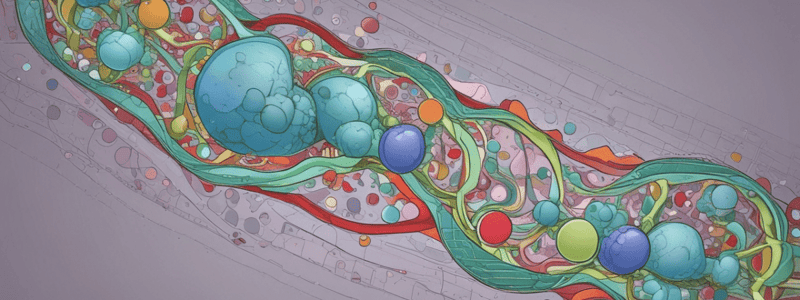Podcast
Questions and Answers
What is the primary function of the cell membrane?
What is the primary function of the cell membrane?
- To provide structural support to the cell
- To regulate what enters and leaves the cell (correct)
- To synthesize proteins
- To store genetic material
What is the term for the study of heredity and variation?
What is the term for the study of heredity and variation?
- Ecology
- Genetics (correct)
- Biology
- Evolution
Which type of cell has a nucleus?
Which type of cell has a nucleus?
- Stem cell
- Eukaryotic cell (correct)
- Nerve cell
- Prokaryotic cell
What is the primary mechanism of evolution?
What is the primary mechanism of evolution?
What is the term for the exchange of genes between populations?
What is the term for the exchange of genes between populations?
What is the primary component of an ecosystem?
What is the primary component of an ecosystem?
What is the term for the study of preserving and protecting biodiversity?
What is the term for the study of preserving and protecting biodiversity?
What is the primary cause of species extinction?
What is the primary cause of species extinction?
What is the term for the release of harmful substances into the environment?
What is the term for the release of harmful substances into the environment?
What is the term for the clearance of forests for human activities?
What is the term for the clearance of forests for human activities?
Flashcards are hidden until you start studying
Study Notes
Biology
Cells
- Basic units of life
- Consist of cell membrane, cytoplasm, and genetic material (DNA or RNA)
- Types:
- Prokaryotic (no nucleus): bacteria, archaea
- Eukaryotic (nucleus present): plants, animals, fungi, protists
Genetics
- Study of heredity and variation
- Key concepts:
- DNA (deoxyribonucleic acid): genetic material
- Genes: sequences of DNA that code for traits
- Chromosomes: thread-like structures carrying genes
- Inheritance patterns: Mendel's laws
Evolution
- Change in species over time through natural selection and genetic drift
- Mechanisms:
- Mutation: change in DNA sequence
- Gene flow: exchange of genes between populations
- Genetic drift: random change in gene frequency
- Natural selection: survival and reproduction of individuals with favorable traits
Environmental Science
Ecosystems
- Communities of living and non-living components interacting in a specific environment
- Components:
- Biotic: living organisms (plants, animals, microorganisms)
- Abiotic: non-living factors (light, temperature, water, soil)
Conservation Biology
- Study of preserving and protecting biodiversity
- Key concepts:
- Habitat destruction: human activities leading to loss of natural habitats
- Species extinction: permanent loss of a species
- Endangered species: species at risk of extinction
- Conservation strategies: habitat restoration, species reintroduction, protected areas
Human Impact on the Environment
- Human activities affecting the environment:
- Pollution: release of harmful substances into the environment
- Climate change: global warming and associated impacts
- Resource depletion: overuse of natural resources
- Deforestation: clearance of forests for human activities
Biology
Cells
- Cells are the basic units of life, consisting of a cell membrane, cytoplasm, and genetic material (DNA or RNA)
- Prokaryotic cells lack a nucleus, examples include bacteria and archaea
- Eukaryotic cells have a nucleus, examples include plants, animals, fungi, and protists
Genetics
- Genetics is the study of heredity and variation
- DNA (deoxyribonucleic acid) is the genetic material that contains genes, which are sequences of DNA that code for traits
- Chromosomes are thread-like structures that carry genes
- Inheritance patterns are explained by Mendel's laws
Evolution
- Evolution is the change in species over time through natural selection and genetic drift
- Mutations occur when there is a change in DNA sequence
- Gene flow is the exchange of genes between populations
- Genetic drift is the random change in gene frequency
- Natural selection is the survival and reproduction of individuals with favorable traits
Environmental Science
Ecosystems
- Ecosystems are communities of living and non-living components interacting in a specific environment
- Biotic components include living organisms such as plants, animals, and microorganisms
- Abiotic components include non-living factors such as light, temperature, water, and soil
Conservation Biology
- Conservation biology is the study of preserving and protecting biodiversity
- Habitat destruction is the human activity that leads to the loss of natural habitats
- Species extinction is the permanent loss of a species
- Endangered species are species at risk of extinction
- Conservation strategies include habitat restoration, species reintroduction, and protected areas
Human Impact on the Environment
- Human activities affect the environment through pollution, climate change, resource depletion, and deforestation
- Pollution is the release of harmful substances into the environment
- Climate change is global warming and its associated impacts
- Resource depletion is the overuse of natural resources
- Deforestation is the clearance of forests for human activities
Studying That Suits You
Use AI to generate personalized quizzes and flashcards to suit your learning preferences.




